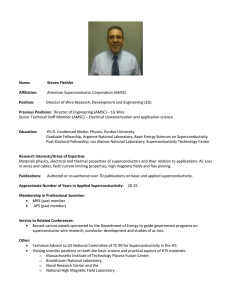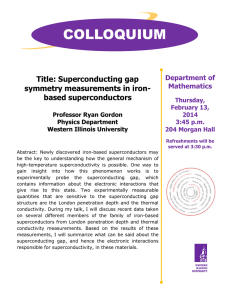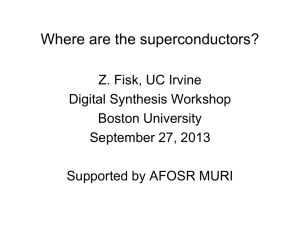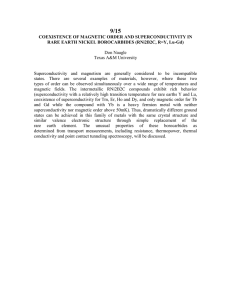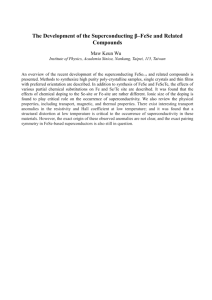Bibliography of Superconductivity
advertisement
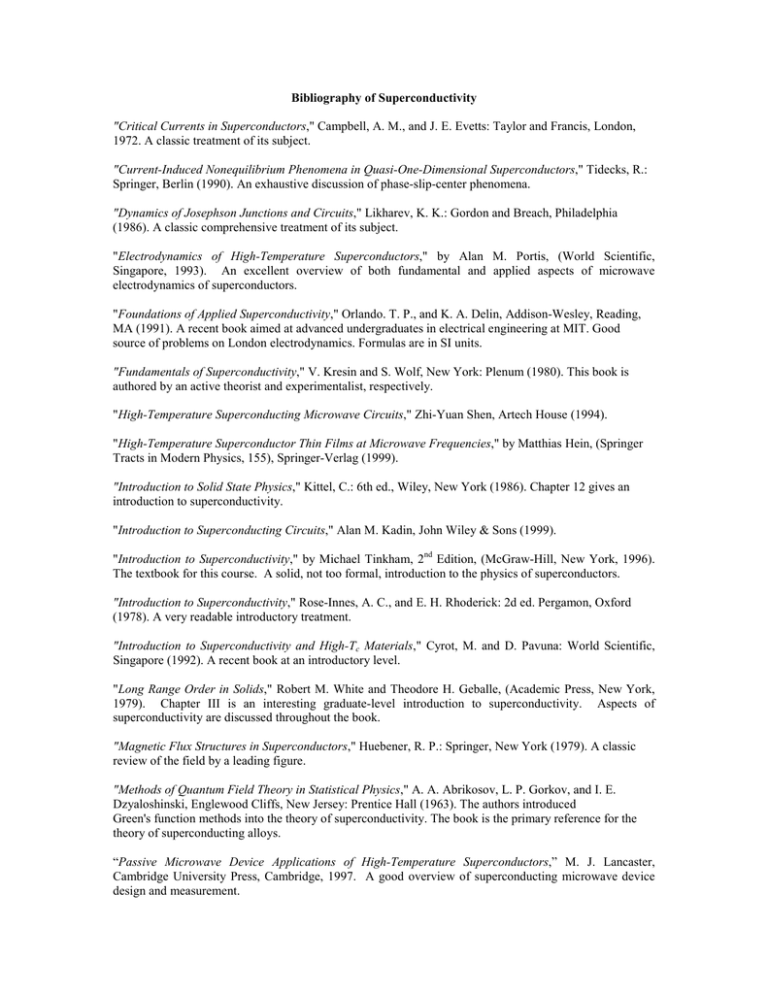
Bibliography of Superconductivity "Critical Currents in Superconductors," Campbell, A. M., and J. E. Evetts: Taylor and Francis, London, 1972. A classic treatment of its subject. "Current-Induced Nonequilibrium Phenomena in Quasi-One-Dimensional Superconductors," Tidecks, R.: Springer, Berlin (1990). An exhaustive discussion of phase-slip-center phenomena. "Dynamics of Josephson Junctions and Circuits," Likharev, K. K.: Gordon and Breach, Philadelphia (1986). A classic comprehensive treatment of its subject. "Electrodynamics of High-Temperature Superconductors," by Alan M. Portis, (World Scientific, Singapore, 1993). An excellent overview of both fundamental and applied aspects of microwave electrodynamics of superconductors. "Foundations of Applied Superconductivity," Orlando. T. P., and K. A. Delin, Addison-Wesley, Reading, MA (1991). A recent book aimed at advanced undergraduates in electrical engineering at MIT. Good source of problems on London electrodynamics. Formulas are in SI units. "Fundamentals of Superconductivity," V. Kresin and S. Wolf, New York: Plenum (1980). This book is authored by an active theorist and experimentalist, respectively. "High-Temperature Superconducting Microwave Circuits," Zhi-Yuan Shen, Artech House (1994). "High-Temperature Superconductor Thin Films at Microwave Frequencies," by Matthias Hein, (Springer Tracts in Modern Physics, 155), Springer-Verlag (1999). "Introduction to Solid State Physics," Kittel, C.: 6th ed., Wiley, New York (1986). Chapter 12 gives an introduction to superconductivity. "Introduction to Superconducting Circuits," Alan M. Kadin, John Wiley & Sons (1999). "Introduction to Superconductivity," by Michael Tinkham, 2nd Edition, (McGraw-Hill, New York, 1996). The textbook for this course. A solid, not too formal, introduction to the physics of superconductors. "Introduction to Superconductivity," Rose-Innes, A. C., and E. H. Rhoderick: 2d ed. Pergamon, Oxford (1978). A very readable introductory treatment. "Introduction to Superconductivity and High-Tc Materials," Cyrot, M. and D. Pavuna: World Scientific, Singapore (1992). A recent book at an introductory level. "Long Range Order in Solids," Robert M. White and Theodore H. Geballe, (Academic Press, New York, 1979). Chapter III is an interesting graduate-level introduction to superconductivity. Aspects of superconductivity are discussed throughout the book. "Magnetic Flux Structures in Superconductors," Huebener, R. P.: Springer, New York (1979). A classic review of the field by a leading figure. "Methods of Quantum Field Theory in Statistical Physics," A. A. Abrikosov, L. P. Gorkov, and I. E. Dzyaloshinski, Englewood Cliffs, New Jersey: Prentice Hall (1963). The authors introduced Green's function methods into the theory of superconductivity. The book is the primary reference for the theory of superconducting alloys. “Passive Microwave Device Applications of High-Temperature Superconductors,” M. J. Lancaster, Cambridge University Press, Cambridge, 1997. A good overview of superconducting microwave device design and measurement. "Phase Transition Approach to High Temperature Superconductivity," T. Schneider and J. M. Singer, Imperial College Press, London (2000). An interesting perspective on high temperature superconductors and their phase transitions. "Physics and Applications of the Josephson Effect," A. Barone and G. Paterno, New York: John Wiley and Sons (1982). The Josephson effect and superconducting magnets are the presently important applications of superconductivity. This book provides an exhaustive account of the former and is recommended to those specializing in this area. A valuable comprehensive review of the field. "Physics of High Tc Superconductors," Phillips, J. C.: Academic Press, San Diego (1989). An individualistic theoretical perspective. "Principles of Superconductive Devices and Circuits," by T. Van Duzer and C. W. Turner, (Elsevier, New York, 1981). A good book for applied superconductivity research. Strengths include a good treatment of superconducting transmission lines and the two fluid model, and extensive use of the Ginzburg-Landau model to understand the basic properties of devices. An introduction to practical applications, especially Josephson junction devices. Has numerous useful graphs and figures. "Quantum Theory of Many-Particle Systems," A. L. Fetter and J. D. Walecka, McGraw-Hill Book Company, New York, (1971). Treatment of superconductivity from a many-body perspective. Also contains an excellent overview of superconducting phenomena, the London equations, and GinzburgLandau theory. “RF Superconductivity for Accelerators,” Hasan Padamsee, Jens Knobloch, and Tom Hays, John Wiley, New York, 1998. Everything you ever wanted to know about designing, building and testing superconducting RF accelerator cavities. It is impressive to see what a mature superconducting technology (based on Nb) has achieved! "Solid State Physics," Ashcroft, N. W., and N. D. Mermin: Holt, Rinehart, and Winston, Philadelphia (1976). Chapter 34 gives an introduction to superconductivity. " SQUIDS, the Josephson Effects and Superconducting Electronics," by J.C. Gallop, Adam Hilger (1991). "States of Matter," Goodstein, D. L.: Prentice-Hall, Englewood Cliffs, NJ (1975), pp. 371-411 on superconductivity. Useful discussion emphasizing thermodynamic and statistical aspects. "Statistical Mechanics," R. P. Feynman, (Benjamin/Cummings, Reading, MA, 1972). Chapter 10 covers superconductivity and chapter 11 covers superfluidity from the Feynman point of view! "Statistical Physics Part II," E. M. Lifshitz and L. P. Pitaevskii, New York: Pergamon (1980). Written in the Landau and Lifshitz style this book wastes no words but simultaneously is very clear. The discussion of Green's functions in many-body physics is the clearest exposition in print in the opinion of Ketterson and Song. The discussions of the Landau Fermi liquid theory and the G-L theory are excellent. "Superconducting Magnets," Wilson, M. N.: Oxford University Press, Oxford (1983). A classic treatment of the design considerations for superconducting magnets by a leading figure. "Superconductivity," D. Shoenberg, Cambridge University Press (1965). A pre- and post-BCS monograph on the magnetic, macroscopic and thermodynamic properties of superconductors. Includes a chapter on early measurements of the magnetic penetration depth, and the two-fluid model. "Superconductivity," Lynton, E. A.: Methuen Monograph, London (1969). A concise survey. "Superconductivity" Parts I and II, R. Parks, Ed., New York: Marcel Dekker (1969). Exhaustive treatments, by acknowledged experts in the field, intended to summarize the state of the field of superconductivity as it existed in 1969. Although a primary reference for many subjects, the level of sophistication needed to utilize the material varies widely among sections. "Superconductivity," by J. B. Ketterson and S. N. Song, (Cambridge University Press, Cambridge, 1999). The book is in three parts: the first deals with phenomenological aspects of superconductivity, the second with the microscopic theory of uniform superconductors, and the third with the microscopic theory of nonuniform superconductors. It presents a series of important calculations and derivations related to superconductivity. "Superconductivity: Fundamentals and Applications," W. Buckel and R. Kleiner, (WILEY-VCH Verlag, Weinheim, 2004). "Superconductivity of Metals and Alloys," by P. G. deGennes, (Addison-Wesley, Redwood City, 1989). Starts with a good phenomenological introduction to superconductivity through its electromagnetic properties. Interesting treatment of vortices and the critical state. An idiosyncratic and unique treatment of the microscopic theory of superconductivity, followed by development of the Bogolubov-deGennes equations. Concludes with extensive examples of the use of the Ginsburg-Landau equations to solve many problems in superconductivity. “Superconductivity of Metals and Cuprates,” John R. Waldram, Institute of Physics Publishing, Bristol, 1996. "Superconductivity of Transition Metals," S. V. Vonsovsky, Yu. A. Tzyumov, and E. Z. Kurmaev, (Springer-Verlag, Berlin, 1982). "Superconductivity: Physics and Applications," K. Fossheim and A. Sudbø, (John Wiley & Sons, Chichester, 2004). "Superconductivity, Superfluids and Condensates," James F. Annett, (Oxford University Press, New York, 2004). "Superconductor Electronics," by J. H. Hinken, (Springer-Verlag, Berlin, 1988). Mainly concerned with the Josephson Effect and related technologies. "Superfluidity and Superconductivity," O. R. Tilley and J. Tilley, Bristol: Adam Hilger Ltd (1986); (3d ed.), Institute of Physics, Bristol (1990). An introductory survey which emphasizes the connection between superfluid helium and superconductivity, contains many helpful illustrations. This book, which is intended for graduate and undergraduate students, treats many topics at a somewhat simpler level. It is useful as an introduction to various topics in superconductivity. "Superfluids," Vol. I and II, F. London, New York: John Wiley and Sons (1950); New York: Dover (1961). Although now quite dated, this book has useful discussions of the macroscopic aspects of superconductivity. Discusses London theory and its philosophical background. It is still valuable for its thoughtful discussion; a famous footnote on p. 152 predicted fluxoid quantization over a decade before it was discovered experimentally. "Theory of Superconductivity," J. R. Schrieffer, New York: Benjamin (1964). An excellent exposition of the BCS pairing theory itself including a fascinating discussion of the motivation behind Schrieffer's choice of the many-body ground-state wavefunction. "Theory of Superconductivity," Rickayzen, G.: Wiley, New York (1965). A good general survey. "The Theory of Quantum Liquids," Vol. 1. Normal Fermi Liquids, D. Pines and P. Nozieres, New York: W. A. Benjamin, Inc. (1966). The book begins with a discussion of the Landau Fermi liquid theory and contains some insights not found elsewhere. Most of the remainder of the book is devoted to developing methods involving correlation functions. "Transmission Lines For Digital and Communication Networks," Richard E. Matick, IEEE Press, New York (1995). Contains an excellent technical discussion of both normal metal and superconducting transmission lines, as well as derivations of the complex surface impedance of bulk and thin film conductors. "Type II Superconductivity," D. Saint-James, E. J. Thomas and G. Sarma, New York: Pergammon (1969). Likely the best discussion of the high field properties of Type II superconductors. The Bogoliubov deGennes approach is adopted for the microscopic properties and the discussions of paramagnetic effects and gapless superconductivity are particularly useful. The G-L treatment of surface superconductivity is also recommended. Collections Ginsberg, D. M. (ed.): Physical Properties of High Temperature Superconductors I, II, III, IV, World Scientific, Singapore (1989, 1990, 1992, 1994). This ongoing series contains authoritative reviews on topics concerning high-temperature superconductivity. Bedell, K. S., et al. (eds.): Phenomenology and Applications of High-Temperature Superconductors, Addison-Wesley, Reading, MA (1992). Proceedings of the Los Alamos Symposium, 1991. Grabert, H., and M. H. Devoret (eds.): Single Charge Tunneling, Plenum, New York (1992). Proceedings of NATO Institute at Les Houches. Evetts, J. (ed.): Concise Encyclopedia of Magnetic and Superconducting Materials, Pergamon, Oxford (1992). Contains authoritative articles by recognized experts on many topics in the science and technology of superconductivity. Ruggiero, S. T., and D. A. Rudman (eds.): Superconducting Devices, Academic Press, New York (1990). Very useful fairly recent survey. Halley, J. W. (ed.): Theories of High Temperature Superconductivity, Addison-Wesley, Reading, MA (1988). A survey of theories proposed in the very early days of high-temperature superconductivity. Goldman, A. 54., and S. A. Wolf (eds.): Percolation, Localization, and Superconductivity, Plenum, New York (1984). Proceedings of NATO Institute at Les Arcs, France. Deaver, B., and J. Ruvalds (eds.): Advances in Superconductivity, Plenum, New York (1983). NATO conference proceedings. Gray, K. E. (ed.): Nonequilibrium Superconductivity, Phonons, and Kapitza Boundaries, Plenum, New York (1981). Proceedings of NATO Institute at Maratea, Italy. Gubser, D. U., T. L. Francavilla, S. A. Wolf, and J. R. Leibowitz (eds.): Inhomogeneous Superconductors, AIP Conference Proceedings No. 58, AIP, New York (1980). Ginzburg, V. L., and D. A. Kirzhnits (eds.): High Temperature Superconductivity (1977): translation: Consultants Bureau, New York (1982). Schwartz, B. B., and S. Foner (eds.): Small Scale Applications of Superconductivity, Plenum, New York (1976). Newhouse, V. L. (ed.): Applied Superconductivity, two vols., Academic Press, New York (1975). Foner, S., and B. B. Schwartz (eds.): Superconducting Machines and Devices; Large Systems Applications, Plenum, New York (1974). Proceedings of a summer school. Parks, R. D. (ed.): Superconductivity, two vols., Dekker, New York (1969); reissued by the publisher in 1992. This two-volume treatise, with chapters written by two dozen distinguished authors on their special areas of interest, is the most comprehensive available treatment of the subject as it stood in 1968. Review articles Blatter, G., M. V. Feigel'man, V. B. Geshkenbein, A. l. Larkin, and V. M. Vinokur: "Vortices in HighTemperature Superconductors," Revs. Mod. Phys. 66, 1125 1388 (1994). An extremely comprehensive and detailed review of the field. Averin, D. V., and K. K. Likharev, "Single Electronics: Correlated Transfer of Single Electrons and Cooper Pairs in Systems of Small Tunnel Junctions" in B. L. Altshuler, P. A. Lee, and R. A. Webb (eds.), Mesoscopic Phenomena in Solids, Elsevier, New York (1991). A classic reference in its field. M. Tinkham and C. J. Lobb: "Physical Properties of the New Superconductors," Solid State Physics 42, 91134 (1989). Carbotte, J. P.: "Properties of Boson-Exchange Superconductors," Revs. Mod. Phys. 62, 1027 (1990). A review of the status of detailed calculations. Tucker, J. R., and M. J. Feldman: "Quantum Detection at Millimeter Wavelengths, ' Revs. Mod. Phys. 57, 1055 (1985). A review. Likharev, K. K.: "Superconducting Weak Links," Revs. Mod. Phys. 51, 101 (1979). An often-cited review. Skocpol, W. J., and M. Tinkham: "Fluctuations Near Superconducting Phase Transitions," Repts. Prog. Phys. 38, 1049 (1975). A review. Anderson, P. W.: "The Josephson Effect and Quantum Coherence Measurements in Superconductors and Superfluids," in C. J. Gorter (ed.), Progress in Low Temperature Physics, vol. 5, Wiley, New York (1967). Notable for its insight into its topic. Tinkham, M.: "Superconductivity,' in C. de Witt, B. Dreyfus, and P. G. de Gennes (eds.), Low Temperature Physics, Gordon and Breach, New York (1962), pp. 147-230. A pedagogical presentation at the Les Houches summer school in the early days of BCS. Bardeen, J.: "Theory of Superconductivity," in S. Flugge (ed.), Handbuch der Physik, vol. 15, Springer Verlag, Berlin (1956). A masterful survey of the state of the theory immediately before BCS. Applied Superconductivity Conference proceedings The proceedings of the biennial Applied Superconductivity Conferences provide an ongoing source of upto-date surveys of the state of the field. Some of the recent ones are found in: IEEE Trans. Magn. MAG25, no. 2, March 1989. IEEE Trans. Magn. MAG27, no. 2, March 1991. IEEE Trans. Appl. Supercond. 3, no. 1, March 1993. IEEE Trans. Appl. Supercond. 5, no. 2, June 1995. IEEE Trans. Appl. Supercond. 7, no. 2, June 1997. IEEE Trans. Appl. Supercond. 9, no. 2, June 1999. IEEE Trans. Appl. Supercond. 11, no. 1, March 2001. IEEE Trans. Appl. Supercond. 13, no. 2, June 2003 IEEE Trans. Appl. Supercond. 15, no. 2, June 2005 IEEE Trans. Appl. Supercond. 17, no. 2, June 2007 IEEE Trans. Appl. Supercond. 19, no. 3, June 2009 IEEE Trans. Appl. Supercond. 21, no. 3, June 2011
